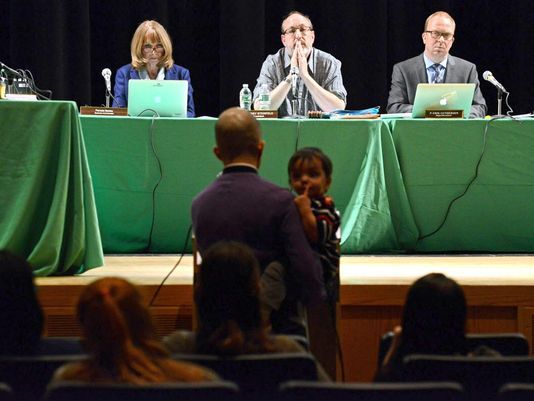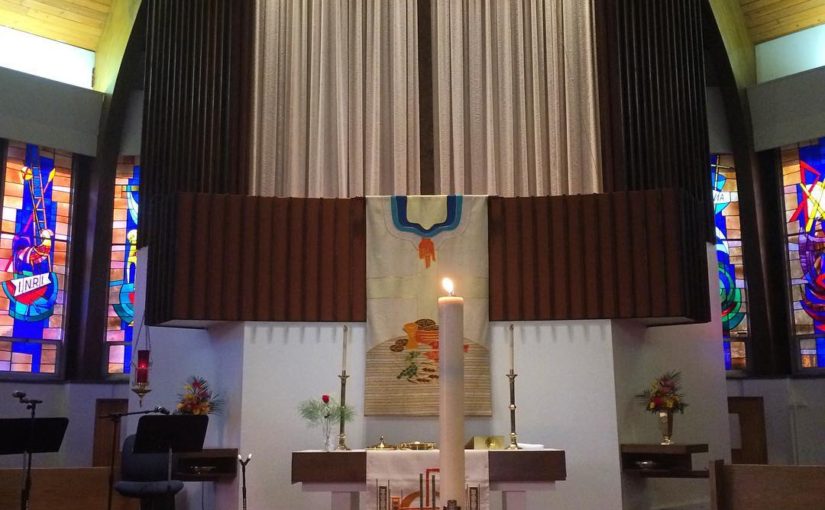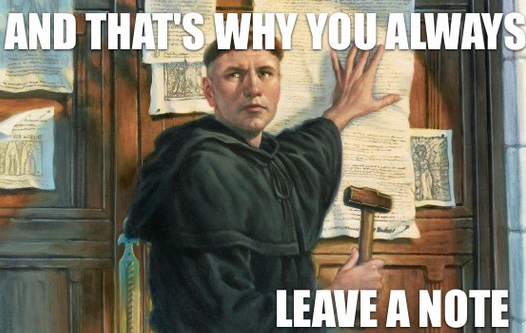The photo of G and I appearing before the Pascack Regional High School Board (first published in April 2016) appeared in this article: Transgender teens quietly gain rights, published in November 16, 2016. Photo by Amy Newman.
Category: Faith
Red Riding Apocalypse: Veterans, Jesus, and how to live until the end of the world.
When some were speaking about the temple, how it was adorned with beautiful stones and gifts dedicated to God, [Jesus] said, “As for these things that you see, the days will come when not one stone will be left upon another; all will be thrown down.” They asked him, “Teacher, when will this be, and what will be the sign that this is about to take place?” And he said, “Beware that you are not led astray; for many will come in my name and say, ‘I am he!’ and, ‘The time is near!’ Do not go after them. “When you hear of wars and insurrections, do not be terrified; for these things must take place first, but the end will not follow immediately.” Then he said to them, “Nation will rise against nation, and kingdom against kingdom; there will be great earthquakes, and in various places famines and plagues; and there will be dreadful portents and great signs from heaven. “But before all this occurs, they will arrest you and persecute you; they will hand you over to synagogues and prisons, and you will be brought before kings and governors because of my name. This will give you an opportunity to testify. So make up your minds not to prepare your defense in advance; for I will give you words and a wisdom that none of your opponents will be able to withstand or contradict. You will be betrayed even by parents and brothers, by relatives and friends; and they will put some of you to death. You will be hated by all because of my name. But not a hair of your head will perish. By your endurance you will gain your souls.
Luke 21:5-19
My sermon from 26th Sunday after Pentecost (November 13, 2016) on Luke 21:5-19.
Podcast: Play in new window | Download
A Great Multitude: who is Jesus talking to in Luke 6?
The Gospel Reading is Luke 6:17-31.
Today’s sermon in the gospel according to Luke should sound familiar. This is Luke’s version of the Sermon on the Mount which appears in the gospel according to Matthew. In Matthew, Jesus begins his public ministry by sharing everything. He sits on a mountain top, surrounded by his disciples and a crowd. When we see Jesus there, he looks like he’s standing between the earth and heaven. We are looking up to Jesus. His words, in this context, point us to “a covenant made with a community to which [we] aspire to belong” (Thomas Frank in Feasting on the Gospels – Luke Volume 1, 2014). Luke’s sermon starts in a different place. Jesus isn’t on a mountaintop. Instead, Jesus comes down from one and teaches while standing “on a level place.”
The crowd gathering around Jesus is filled with different kinds of people. Some come from Judea (the area around Jerusalem) while others come from the city of Jerusalem itself. Another group, however, comes from the coast of Tyre and Sidon. Tyre and Sidon are old cities and city-states founded and ruled by the ancient Philistines. The Philistines fought wars against Israel, King David, and the early Israelites. At one point, they even captured the Ark of the Covenant itself! Tyre and Sidon are also areas associated with kings and queens who ruled parts of Israel and encouraged the people of Israel to follow other gods. As cities on the coast, Tyre and Sidon did have faithful Jewish merchants and followers of God living within their walls. But Tyre and Sidon are places that should be hostile to God. But this crowd is different. This great multitude is full of the “right” kind of believers and the “wrong” kind too. There are people hear who we do not expect. But these unexpected people are standing alongside us, wanting to be healed and learn what God is doing in the world. So Jesus, seeing this crowd full of unexpected people, does a very unexpected thing. He is not standing above the crowd; he is inside of it. Jesus, when he looks at the people around him, is standing at eye level. He in the middle of this crowd full of the right and wrong kind of people. God is doing more than inspiring us to join what God is doing in the world. God is coming into the middle of us, meeting us where we are at right now, and bringing us into God’s future.
Each week, I write a reflection on one of our scripture readings for the week. This is from Christ Lutheran Church’s Worship Bulletin for 11/06/2016.
Do To: a sermon on All Saints’ Sunday staring Jesus, Coming Down, and the 2016 Election.
[Jesus] came down with them and stood on a level place, with a great crowd of his disciples and a great multitude of people from all Judea, Jerusalem, and the coast of Tyre and Sidon. They had come to hear him and to be healed of their diseases; and those who were troubled with unclean spirits were cured. And all in the crowd were trying to touch him, for power came out from him and healed all of them.
Then he looked up at his disciples and said: “Blessed are you who are poor, for yours is the kingdom of God. “Blessed are you who are hungry now, for you will be filled. “Blessed are you who weep now, for you will laugh. “Blessed are you when people hate you, and when they exclude you, revile you, and defame you on account of the Son of Man. Rejoice in that day and leap for joy, for surely your reward is great in heaven; for that is what their ancestors did to the prophets. “But woe to you who are rich, for you have received your consolation. “Woe to you who are full now, for you will be hungry. “Woe to you who are laughing now, for you will mourn and weep. “Woe to you when all speak well of you, for that is what their ancestors did to the false prophets.
“But I say to you that listen, Love your enemies, do good to those who hate you, bless those who curse you, pray for those who abuse you. If anyone strikes you on the cheek, offer the other also; and from anyone who takes away your coat do not withhold even your shirt. Give to everyone who begs from you; and if anyone takes away your goods, do not ask for them again. Do to others as you would have them do to you.
Luke 6:17-31
My sermon from All Saints’ Sunday (November 6, 2016) on Luke 6:17-31.
Podcast: Play in new window | Download
One-Liners
The Gospel Reading is John 8:31-36.
“The truth shall set you free” is such a great line and is one of many great lines from the gospel according to John. This line is also beautiful and why we hear this reading every year at this time. As Lutheran Christians, the last Sunday in October is a time when we dress up the church in red and celebrate. But today is more than just the day before Halloween. The last Sunday in October is Reformation Sunday. We remember how, on October 31, a monk posted on a church door 95 thoughts about God and the church. We remember and celebrate all our faith-filled fore bearers who lived their faith out loud and passed this faith down to us. This October 31 will mark the beginning of our 500th year as a community of faith living called Lutheran. Today is a day when we remember how the past formed us and how faith is transforming us and our world. Reformation Sunday is always a Sunday looking into the future and seeing where God is taking us next. Reformation is about relationship.
Relationship is at the heart of today’s reading from John and we see that relationship when we leave these words in context. When we take verses of scripture out of context, we miss what Jesus is saying. Today’s reading isn’t about freedom as we understand it (personal liberty, autonomy, and the ability to make our own choices). Jesus is speaking during a conversation with people who followed him and then stopped. Something caused these early followers of Jesus to not buy into what Jesus was doing and saying. These early followers stopped trusting in Jesus’ identity and mission. Jesus uses this opportunity to expand our definition of faith. Faith is more than agreeing to a series of propositions or ideas. Faith is more than an intellectual experience and does not resemble the tests we take in school. Faith is, in the words of this passage, about a relationship with God. In the words of Gilberto Ruiz, professor at Saint Anselm College, “the verb translated in the New Revised Standard Version as ‘continue’ in John 8:31 is meno, a key term in John’s Gospel that is often translated as ‘remain’ or ‘abide’ and points to the permanent or enduring nature of the relationship between Jesus and the believer…by taking into consideration that Jesus’ language focuses on ‘remaining’ and that his audience is a group whose faith in him did not ‘remain,’ we see that this passage presents faith as a continuing relationship. The true disciple ‘remains’ in a faith relationship with Jesus, and it is this disciple who will be set free by knowing the truth revealed by Jesus.” Faith is more than just saying yes to God; faith is walking with Jesus over the long haul. And that’s not easy.
Relationships are never easy. Relationships take time. They require compromise, conversation, engagement, give, and take. There are times when our relationships are full of joy and other times when we are angry or sad. And our relationship with God is filled with the same kind of feelings and experiences. Sometimes our relationship with God feels completely unlike what we expect faith to be. But our faith with God doesn’t depend on what we feel or think. Our faith is a gift from God. God doesn’t wait for us to reach out; God comes to us instead. God starts our relationship through the gifts of baptism, parents, communities of faith, and the Holy Spirit herself. Faith is about what happened yesterday, who we are today, and where we are going in the future. Faith is a relationship and the Reformation is celebrating a God who starts that relationship so we can live into a future God is already preparing.
Each week, I write a reflection on one of our scripture readings for the week. This is from Christ Lutheran Church’s Worship Bulletin for 10/30/2016.
Re-what? a sermon on Reformation Sunday about Jesus and former believers.
Then Jesus said to the Jews who had believed in him, “If you continue in my word, you are truly my disciples; and you will know the truth, and the truth will make you free.” They answered him, “We are descendants of Abraham and have never been slaves to anyone. What do you mean by saying, ‘You will be made free’?” Jesus answered them, “Very truly, I tell you, everyone who commits sin is a slave to sin. The slave does not have a permanent place in the household; the son has a place there forever. So if the Son makes you free, you will be free indeed.
John 8:31-36
My sermon from the 24rd Sunday After Pentecost – Reformation Sunday (October 30, 2016) on John 8:31-36.
Podcast: Play in new window | Download
Who Are the Tax Collectors?
The Gospel Reading is Luke 18:9-14.
Tax collecting in Jesus’ era was a messy business. The system we use today is different. Many of us first experience taxes when we buy something. A sales tax is added to the bill. We also might have taxes taken out of our paycheck and spend hours trying to figure out a tax system that changes every year. Our system includes lawyers, accountants, and others who help us figure out the taxes we pay. Our system is not perfect but this system provides the money for roads, schools, hospitals, the military, and countless other institutions and activities that connect us as a community.
Tax collecting in Jesus’ time didn’t work this way. Kings and emperors set a target for how much money they wanted to collect. These leaders did not have the institutions or the human resources to travel around and collect the taxes themselves Instead they hired tax collecting firms to collect the money for them. Tax collectors could even sub-contract to other tax collecting firms. These firms were legally empowered to collect the tax along with a “commission.” People who were taxed had to pay the original tax and the additional “commission.” Tax collectors did more than collect taxes: they collected their own paycheck as well.
The tax collectors Jesus called as his disciples were hated for a variety reasons. People did not like paying the tax and being connected connected to an occupying army (the Roman Empire) who set the taxes. Tax collectors worked “on behalf politically oppressed and economically exploitive system of imperial domination.” (Gregory Allen Robbins in Feasting on the Gospels, Luke Volume 2). Tax collectors supported and sustained an empire that invaded Israel, conquered it, and determined who its leaders were.
No one liked tax collectors. People avoided tax collectors and religious leaders rightly saw tax collectors as problems. But today’s text is powerful because Jesus does more than talk about tax collectors. Jesus calls one as an apostle (Levi) and he’ll eat with them in their homes. Jesus doesn’t avoid the tax collector. Instead, Jesus loves them.
Each week, I write a reflection on one of our scripture readings for the week. This is from Christ Lutheran Church’s Worship Bulletin for 10/23/2016.
Standing By Himself: a sermon on a Philistine, a tax collector, and more than 2 choices.
He also told this parable to some who trusted in themselves that they were righteous and regarded others with contempt: ‘Two men went up to the temple to pray, one a Pharisee and the other a tax-collector. The Pharisee, standing by himself, was praying thus, “God, I thank you that I am not like other people: thieves, rogues, adulterers, or even like this tax-collector. I fast twice a week; I give a tenth of all my income.” But the tax-collector, standing far off, would not even look up to heaven, but was beating his breast and saying, “God, be merciful to me, a sinner!” I tell you, this man went down to his home justified rather than the other; for all who exalt themselves will be humbled, but all who humble themselves will be exalted.’
Luke 18:9-14
My sermon from the 23rd Sunday After Pentecost (October 23, 2016) on Luke 18:9-14.
Podcast: Play in new window | Download
From Pastor Marc – My Message for the Messenger, November 2016 Edition
For the last year, I’ve been working with colleagues to revamp and upgrade the amazing work done at the Tri-Boro Food Pantry (formerly known as the Pascack Food Center). For decades, this food pantry (housed at Pascack Reformed Church in Park Ridge) has served people in our community who are in need. Recently, we’ve seen more people using the pantry’s services. Even in an area as wealthy as ours, food insecurity still exists. People in Northern New Jersey are suffering the effects of poverty. And this food pantry continues to grow to meet the needs of all who are looking for milk, eggs and other food for themselves and their families.
Each week, many of the pantry’s new volunteers are busy organizing and sorting food donations as they come in. October, November and December are the busy times for food drives. As we give thanks for our blessings, we feel compelled to help others. Cub scouts, schools and fire departments are busy collecting food and delivering hundreds of items to the pantry. This generosity is amazing and saves lives. We can’t be thankful enough for all who feed people during this time of year.
In the middle of this generosity, however, we need to remember that hunger never takes a vacation. Food insecurity can strike people and families at any time. New people who have never used a pantry before will be visiting the Tri-Boro Food Pantry for the first time in the spring and summer when an unexpected job loss, medical expense or change in lifestyle makes their next meal uncertain. As a church, we do more than feed people during the season of thanksgiving; we feed people all year long. The snack packs we packed to feed elementary school kids, the Genesis garden growing vegetables in the summer, the hunger appeal during Lent, and the dedicated box in the narthex that collects food all year long is just a sample of how we take care of people no matter what time of year it is. At this time, I am thankful for you because of all you contribute and do to fight hunger all year long. I am thankful that the love Jesus showers on you is expressed through your dedication in making a difference in our neighbor. I pray that your November is full of thankfulness, generosity and unbridled grace.
See you in church!
Pastor Marc



